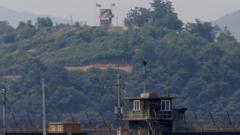Amid intense diplomatic activity aimed at resolving the ongoing conflict, Ukraine's President Zelensky asserts that Russia is hindering efforts to hold a peace summit. Despite U.S. President Trump's attempts to facilitate a meeting, Zelensky insists on necessary security guarantees for Ukraine, as Russia continues military assaults.
Zelensky Accuses Russia of Sabotaging Peace Efforts Amid Ongoing War

Zelensky Accuses Russia of Sabotaging Peace Efforts Amid Ongoing War
Ukraine's President Volodymyr Zelensky claims Russia is actively working to obstruct peace talks and prolong the conflict, despite diplomatic efforts.
In a pointed address, Ukrainian President Volodymyr Zelensky accused Russia of "doing everything it can" to avoid a meeting with President Vladimir Putin to facilitate an end to the persistent conflict. U.S. President Donald Trump has been making efforts to bring the two leaders together, although he remarked that their relationship resembles "oil and vinegar" — indicating significant tensions.
Russian Foreign Minister Sergei Lavrov stated that while Putin is open to dialogue, he claims the agenda for such a summit is not ready, implying a lack of cooperation from Ukraine. In recent diplomatic exchanges, which included a meeting between Trump and Putin in Alaska, followed by discussions involving Zelensky and European leaders in Washington, the prospects for peacemaking surfaced as a daunting challenge according to Trump.
Zelensky expressed his willingness to engage in negotiations and emphasized that Ukraine does not harbor fears about meetings with world leaders. However, he insisted that any discussions must come with security assurances from Western allies, stating, "Ukraine, unlike Russia, is not afraid of any meetings between leaders."
The NATO Secretary General, Mark Rutte, visiting Ukraine, affirmed that efforts are underway to devise a set of security guarantees that would fortify Ukraine against Russian aggression. Zelensky highlighted the need for these assurances to align with NATO's Article 5 principle that an attack on one member is regarded as an attack on all.
Zelensky explained the complexities involved in establishing these guarantees, noting that they would need to ensure Ukraine's military strength while also determining the commitments from partners abroad. Past security agreements have often failed to provide the intended protection, raising skepticism among Ukrainians regarding these recent proposals.
Responding to concerns about potential diplomatic deadlocks, Zelensky remarked on the sense of unity he observed in Washington, indicating a possible turning point compared to previous weeks. Meanwhile, Lavrov, during an interview, expressed skepticism about the likelihood of a summit, suggesting that Russia displayed flexibility in negotiations, whereas he perceived Ukraine's stance as rigid.
EU Foreign Policy Chief Kaja Kallas warned that Russia may be crafting a trap in negotiations over territorial concessions. Despite these discussions, Russia has intensified its military offensive, launching significant drone and missile strikes across Ukraine. At the same time, Ukraine has retaliated with targeted attacks, disrupting Russian energy supplies through the Druzhba pipeline.
As both sides brace for further military engagements, Zelensky's calls for solidarity and security guarantees resonate deeply amidst the ongoing turmoil, stirring a complex narrative of hope and apprehension regarding the future of Ukraine.
Russian Foreign Minister Sergei Lavrov stated that while Putin is open to dialogue, he claims the agenda for such a summit is not ready, implying a lack of cooperation from Ukraine. In recent diplomatic exchanges, which included a meeting between Trump and Putin in Alaska, followed by discussions involving Zelensky and European leaders in Washington, the prospects for peacemaking surfaced as a daunting challenge according to Trump.
Zelensky expressed his willingness to engage in negotiations and emphasized that Ukraine does not harbor fears about meetings with world leaders. However, he insisted that any discussions must come with security assurances from Western allies, stating, "Ukraine, unlike Russia, is not afraid of any meetings between leaders."
The NATO Secretary General, Mark Rutte, visiting Ukraine, affirmed that efforts are underway to devise a set of security guarantees that would fortify Ukraine against Russian aggression. Zelensky highlighted the need for these assurances to align with NATO's Article 5 principle that an attack on one member is regarded as an attack on all.
Zelensky explained the complexities involved in establishing these guarantees, noting that they would need to ensure Ukraine's military strength while also determining the commitments from partners abroad. Past security agreements have often failed to provide the intended protection, raising skepticism among Ukrainians regarding these recent proposals.
Responding to concerns about potential diplomatic deadlocks, Zelensky remarked on the sense of unity he observed in Washington, indicating a possible turning point compared to previous weeks. Meanwhile, Lavrov, during an interview, expressed skepticism about the likelihood of a summit, suggesting that Russia displayed flexibility in negotiations, whereas he perceived Ukraine's stance as rigid.
EU Foreign Policy Chief Kaja Kallas warned that Russia may be crafting a trap in negotiations over territorial concessions. Despite these discussions, Russia has intensified its military offensive, launching significant drone and missile strikes across Ukraine. At the same time, Ukraine has retaliated with targeted attacks, disrupting Russian energy supplies through the Druzhba pipeline.
As both sides brace for further military engagements, Zelensky's calls for solidarity and security guarantees resonate deeply amidst the ongoing turmoil, stirring a complex narrative of hope and apprehension regarding the future of Ukraine.


















